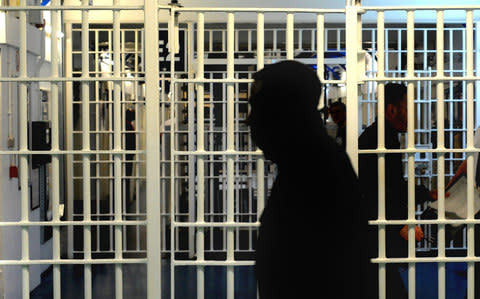Prison officers armed with incapacitant spray to defend themselves against inmates

Prison officers are to be equipped with canisters of an "incapacitant" substance similar to pepper spray in order to defend themselves against the most aggressive inmates.
Ministers said the use of Pava spray would be trialled by ordinary officers in four prisons, having previously only been used by specialist riot teams.
The measure is intended to help staff tackle unpredictable and dangerous levels of aggression linked to a recent influx of psychoactive drugs such as Spice and Mamba, a government source said.
It is one of several measures announced today which ministers said would give officers "the right tools for the job".
The Government is also funding the roll-out of 5,600 body-worn cameras across the country to act both as a deterrent against violent behaviour and to record evidence to aid prosecutions.

The move will mean that "every prison across England & Wales now has access to a body-worn cameras".
The announcement comes after prisons violence reached record levels, with assaults on staff rising by a third over the past year to 20 a day.
In June new figures revealed that 7,159 staff were assaulted in the year to March 2017, up by 1,750. Steve Gillan, General Secretary of the Prison Officers Association, said the announcements were "a step in the right direction".
The union had been demanding body worn cameras and the roll-out of Pava "for the last 18 months" in order to help deal with assaults on staff.
But he added: "Prisoners and prison staff have been put at risk because of budget cuts since 2010. "The bottom line is we need staffing levels to equate at least to the 2010 levels if we are to bring about safety in our prisons."
The Government is half way through a recruitment drive to hire 2,500 frontline officers, having so far taken on 1,290 extra personnel.
Pava spray will initially be trialed at four prisons - HMP Wealstun in West Yorks, HMP Risley in Cheshire, HMP Preston in Lancashire, and HMP Hull.
Staff at each are currently being trained in how to use the spray. Previously only the Specialist National Tactical Response Group officers, known as Tornado teams, who are brought in to tackle prison riots, have had access to the substance.
The measures announced today also include £1 million being invested in police-style handcuffs with rigid bars between the two cuffs, which make it easier for officers to restrain aggressive inmates, by holding onto the bar rather than having to grab prisoners by their limbs.
Sam Gyimah, the prisons minister, said: “I am absolutely determined to tackle head-on the issues that undermine the safety and security of our prisons and to ensure our dedicated officers have the tools they need to do the job."
Last year around 240 prisoners were moved out of HMP Birmingham following what was described as the "worst prison riot since Strangeways", more than 25 years ago.
Four wings at the privately-run Category B prison were overrun by inmates during the incident, which lasted for more than 12 hours.
Tornado teams were deployed while photographs taken inside the prison by inmates and then shared on social media showed some of the alleged rioters wearing prison officers’ uniforms and showing off sets of keys.
Following the riot, Michael Spurr, the head of the National Offender Management Service, suggested violence in prisons was partly on the rise due to legal highs.
"There is more gang-related violence, much more serious violence from prisoners who come into prison now than previously and that has been fuelled also by psychoactive drugs, so-called legal highs Mamba and Spice, that have been sent and pushed into prisons, supplied into prisons that have really changed the dynamic," he said.

 Yahoo News
Yahoo News 
